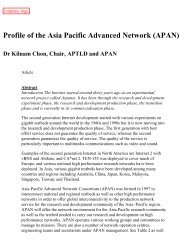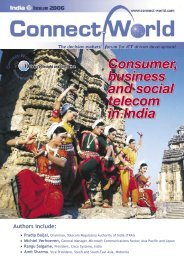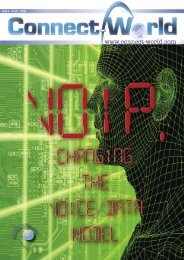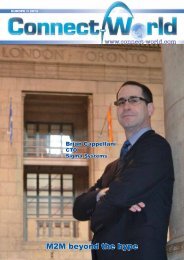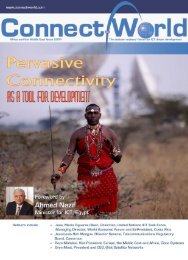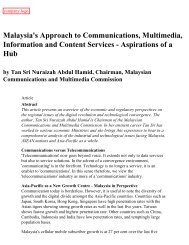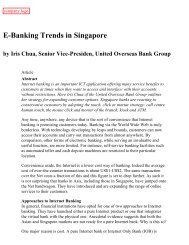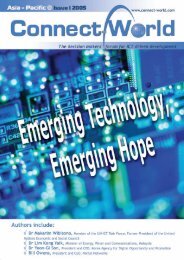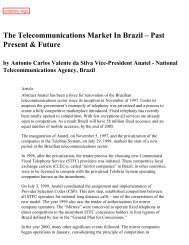Contents - Connect-World
Contents - Connect-World
Contents - Connect-World
You also want an ePaper? Increase the reach of your titles
YUMPU automatically turns print PDFs into web optimized ePapers that Google loves.
National Development<br />
Indias intellectual capital its neural network<br />
by Dr Jon Earith, Chief Technology Officer, MBT<br />
India is transforming itself, and the nations economy, through the exploitation of its intellectual<br />
capital, is building upon education to drive the country from service provider to<br />
innovator and technological leader. Indian companies have long offered IT services internationally.<br />
At first, they provided coders for western software, but, over time, added genuine<br />
expertise in design and consultancy. Today, companies in search of overall value look<br />
to Indian offshore partnerships for the distinctive skills and high performance they offer.<br />
Dr Jon Earith is MBTs Chief Technical Officer. Before MBT, Jon held senior positions at IBM Global<br />
Services, Sema, Cable and Wireless and BT where, working at Syntegra, he led the UK systems and consultancy<br />
integration team. Subsequently, Dr Earith founded Telecoms Consultants and Management Ltd one of<br />
the UKs leading independent Telecoms consultancy companies.<br />
Jon obtained a PhD from Nottingham University. Dr Eariths research focused on fibre optic communications<br />
and culminated in the design and installation of the first long haul system in the UK. Dr Earith, an<br />
engineer and MBA as well, has had extensive overseas experience in North America, Brazil, Asia, India and<br />
China.<br />
Over the last fifteen to twenty years,<br />
India has taken great strides forward<br />
in terms of business development, by<br />
increasingly opening up to the outside<br />
world, encouraging foreign investment<br />
and economic reform.<br />
Looking to the future, optimism about<br />
the countrys continuing success on<br />
the global stage is fuelled by a growing<br />
recognition of one of its greatest<br />
strengths — the depth of its intellectual<br />
capital.<br />
One way to understand this is to consider<br />
the advanced computing technique,<br />
known as artificial intelligence,<br />
which models the electronic<br />
brain on the human one—on the neural<br />
network.<br />
In computing, such networks, which<br />
often deploy Bayesian and other techniques<br />
to replicate human intellectual<br />
processing, have enormous power.<br />
One could argue that, in todays India,<br />
there is such power—an entirely<br />
human neural network, a rapidly<br />
developing organism, dependent upon<br />
people who are both highly educated<br />
and highly motivated. That power is<br />
delivering a growing competitive<br />
advantage to India, generating<br />
increasingly rich and rare skill sets<br />
and nurturing new intellectual property.<br />
Educational empowerment<br />
Gandhi said: "The purpose of education<br />
is to bring out the best in you."<br />
The Indian philosophy of<br />
Upanishadas makes it clear that education<br />
is much more than the transference<br />
of knowledge; it is the development<br />
of character.<br />
The goal of education is not to create<br />
individuals who can reiterate todays<br />
knowledge, but to empower them to<br />
describe new solutions to new challenges.<br />
That is precisely what is happening in<br />
India and the result is a transformation<br />
in the nations economy, through<br />
the exploitation of intellectual capital.<br />
It is driving the country from service<br />
provider to innovator and technological<br />
leader.<br />
As far back as the late 1970s and early<br />
1980s, Indian companies offered IT<br />
services internationally. Back in those<br />
days it was simply bodyshopping; providing<br />
coders to implement western<br />
software designs. Indian work proved<br />
reliable and significantly lower-cost<br />
than the home resource.<br />
Nevertheless, you cannot build a longterm<br />
business — or a nations prosperity<br />
— on price. Someone else will<br />
always undercut you. The price<br />
13



